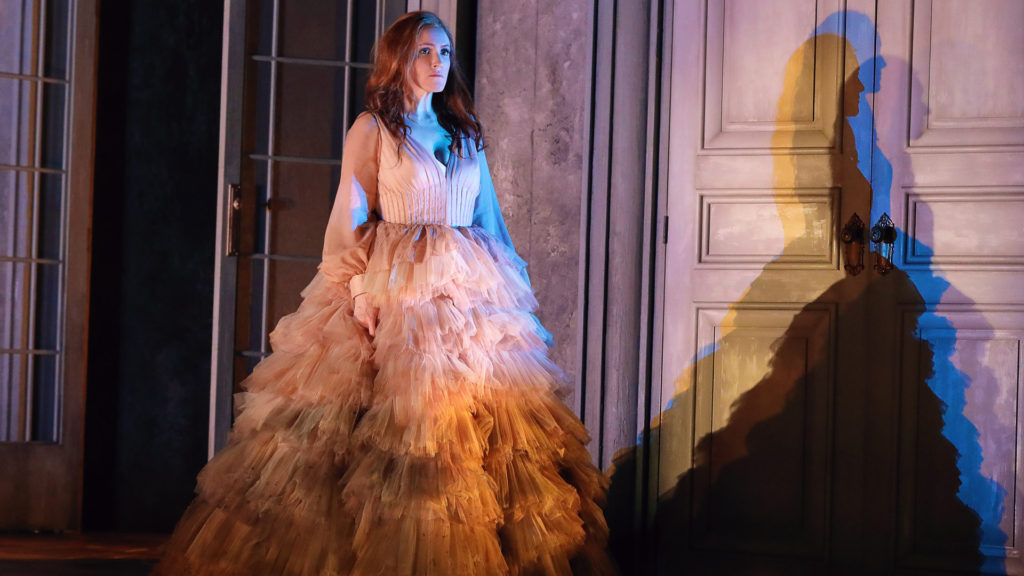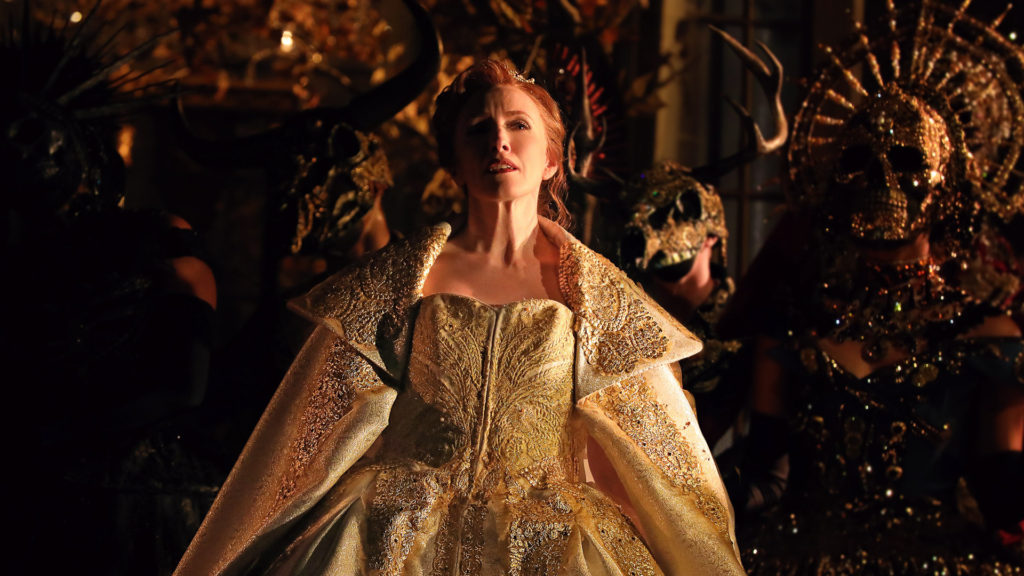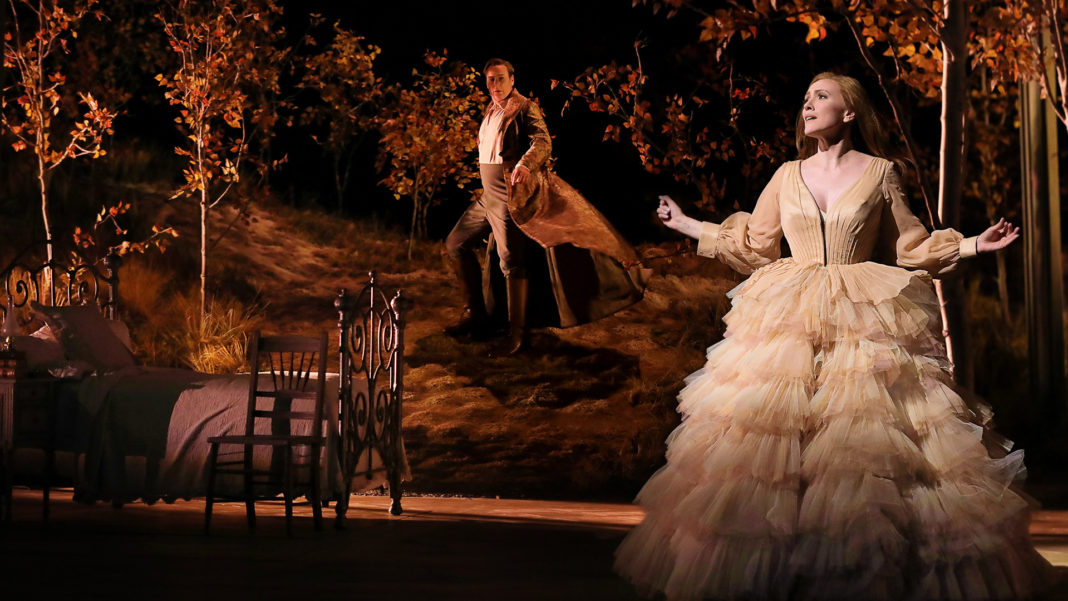You can call it a homecoming for soprano Sara Jakubiak who is singing the role of Tatyana in Santa Fe Opera’s Eugene Onegin. She was a young artist there in 2007 and the last-minute opportunity to return to be in Tchaikovsky’s opera was too good to be true and one that she actually put out into the universe that she wanted.
“I was having dinner with a friend of mine who is on the staff in Vienna the night before I got the call for this,” Jakubiak told me via Zoom last week. “He said, ‘Sara, what do you really want to sing if you could sing any role?’ And I said I want to sing Tatyana. I literally got the call the next day.”
Nicole Car was originally announced to sing the part opposite her husband, Etienne Dupuis. Travel restrictions related to the pandemic made that impossible. Jakubiak and baritone Lucas Meachem were tapped to assume the roles.
Jakubiak first sang the role of Tatyana at Oper Frankfurt. Her other roles have included Eva in Der Meistersinger von Nürnberg, Elsa in Lohengrin and Prima Donna in Ariadne auf Naxos. But it is with Tatyana at Frankfurt that we begin our conversation. What follows are excerpts from that interview that have been edited for length and clarity.

How has your relationship to Tatyana evolved since you first sang it with Oper Frankfurt?
I would say vocally I’ve evolved more in the last five years than anything. So there were new avenues to explore with her as far as expression goes in colors. The music team here and Alessandro [Taveli, the director] were really wonderful with me, with expressing this role in a language I don’t speak. You have to work very hard at your translation. It was very helpful to be in a place like Santa Fe because I think the piece, as Russian as it is, has all of these colors that you see around you here in the landscape and the set design.
For an opera called Eugene Onegin, Tatyana has a very prominent role. Why do you think Tchaikovsky made her such an integral part of this story? If he had been able to be more open about his homosexuality do you think this opera might have been very different?
Well she is out there all the time working! (She lets out a glorious laugh.) I know he fiddled with the idea of why did I call this Onegin when maybe I should have called it Tatyana. Thank God that Tchaikovsky was a composer and could express himself at least in this way. Thank God he had this outlet to write these characters the way he did to music that he wrote. Some of the things she says in the letter scene go to a deep part of the soul that you rarely access. I think that was sort of his sexuality. It’s certainly a window into what he was feeling inside.
You told Opera Wire that “an effective vaccine should get us back to the old normal, but with the new awareness about life.” What are the most striking aspects of your new awareness about life both on and off the stage?
My grandmother passed away at the age of 100 and she was born in 1919. She was really bookended by pandemics. The last conversation I had with her was on her birthday and I hadn’t seen her for six years. I made it to her party and saw her the next morning when I was going away. She said, “Where are you going to next?” I told her I was going to Norway. She just said, “You really have a great life.”
She didn’t really deal with pandemics, but several wars and she saw the massive changes of the 20th century with technology and everything. I keep playing this in my mind during these last sixteen months. I do believe that there is still beauty and there is beauty we don’t even know about yet from this pandemic. And it will continue to unfold. We’re going to see more beauty and it’s only just creeping out of the ground right now.

Lucas Meachem told me one of his biggest challenges is to stay honest at all times during a performance.
Me, too. This role does have its corners that are a little tricky. It’s a bit of a lower role and sometimes you have to work hard to support that. Sometimes when you are doing really difficult roles you do have to micromanage things. I have to say sometimes just in the moment is not always the smart way to go. You could blow your voice out sometimes if you are really in the moment.
You and Lucas will also be performing Tannhäuser this fall at Los Angeles Opera. How would you describe your chemistry and are you looking forward to moving on to another production with him?
I was actually a little nervous coming in because we’ve been in different types of productions and he’s got a huge career. So I hope I can survive at the table with him. But you really have to push that stuff aside and just be in the moment. That’s what I like about Lucas. He’s a very in the moment person and I believe him on stage. It’s a wonderful feeling.
Tchaikovsky said “Truly there would be reason to go made were it not for music.” Can you imagine your life without it?
No I couldn’t. I grew up with rock music. I saw my first opera when I was like 20. It was rural around me. But I used to go on my swing set every day as a kid and sing. I don’t know why. You don’t always have to know the reason why it is inside of you. You figure it out later. Maybe this is why I ended up doing this and it’s something I need. You don’t do it because it’s an easy thing. But it’s something I have to do.
For tickets to Eugene Onegin, please go here. There are performances on August 6th, 12th, 20th and 26th.
This is the last in a series of interviews with artists appearing this season at Santa Fe Opera.
Main photo: Lucas Meachem and Sara Jakubiak in Eugene Onegin. (Photo by Curtis Brown/Courtesy Santa Fe Opera)











